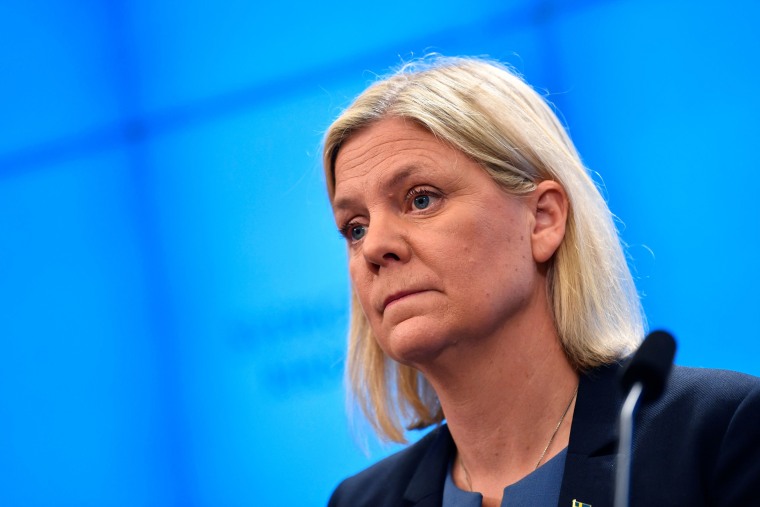Hours after being tapped as Sweden’s prime minister, Magdalena Andersson resigned Wednesday after suffering a budget defeat in parliament and her coalition partner left the two-party minority government.
”For me, it is about respect, but I also do not want to lead a government where there may be grounds to question its legitimacy,” Andersson said at a news conference.
She informed parliamentary Speaker Anderas Norlen that she remains interested in leading a Social Democratic one-party government.
Andersson said “a coalition government should resign if a party chooses to leave the government. Despite the fact that the parliamentary situation is unchanged, it needs to be tried again.”
Her resignation came just hours after Sweden’s parliament approved Andersson as the country’s first female prime minister, tapping the finance minister who recently became the new leader of the Social Democratic party.
Download the NBC News app for breaking news and politics
Andersson had been set to replace Stefan Lofven as party leader and prime minister, roles he relinquished earlier this year.
The development marked a milestone for Sweden, viewed for decades as one of Europe’s most progressive countries regarding gender relations but which had yet to have a woman in the top political post.
Lofven’s government describes itself as feminist, putting equality between women and men at the heart of national and international work.
In a speech to parliament, Amineh Kakabaveh, an independent lawmaker who supported Andersson, had noted that Sweden is currently celebrating the 100th anniversary of a decision to introduce universal and equal suffrage in the Scandinavian country.
“If women are only allowed to vote but are never elected to the highest office, democracy is not complete,” said Kakabaveh, who is of Iranian Kurdish descent.
“There is something symbolic in this decision,” she added. “Feminism is always about girls and women being complete people who have the same opportunities as men and boys.”
Andersson said of Kakabaveh after her appointment, where she received a standing ovation and a bouquet of red roses: “I was really moved by what she said. She pinpointed exactly what I thought.
“I have been elected Sweden’s first female prime minister and know what it means for girls in our country.”
Under the Swedish Constitution, prime ministers can be named and govern as long as a parliamentary majority — a minimum of 175 lawmakers — is not against them.
In the In the 349-seat Riksdag, 174 lawmakers rejected her appointment. A total of 117 voted yes, 57 abstained and one was absent.
Lofven has been leading the Swedish government in a caretaker capacity until a new government is formed, something expected Friday. Andersson likely will form a two-party, minority government with her Social Democrats and the Green Party.
Andersson, 54, sought to secure the backing of the two smaller parties that supported Sweden’s previous center-left, minority government led by Lofven — the Left Party and the Center Party. Both abstained from voting against Andersson.
After days of talks, Andersson and the Left Party reached a deal to win the latter’s support.
